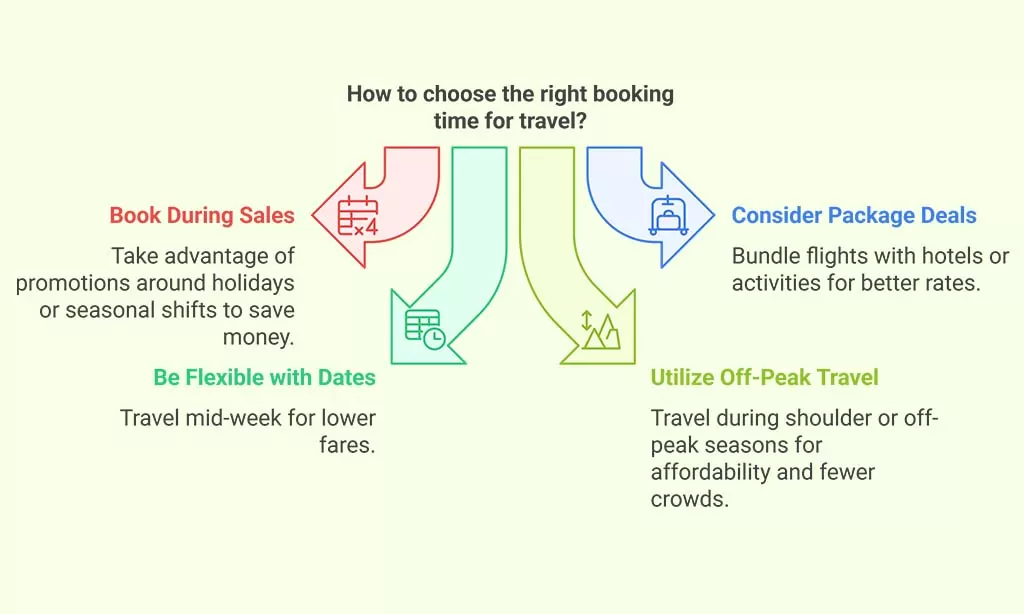When planning your next adventure, one of the most important questions to consider is how far in advance should I book a flight. Understanding the various factors that influence flight prices—such as peak vs. off-peak seasons—can help you make smarter decisions, score the best deals, and ensure a smooth travel experience. Let’s explore the key considerations that affect timing your booking just right.
Peak vs. Off-Peak Seasons
Traveling during peak seasons, such as school holidays, summer vacations, and major holidays, can significantly impact flight prices. Here are a few considerations when determining your travel timing:
- Higher Prices: Flights during peak seasons tend to be more expensive due to increased demand.
- Limited Availability: You might find fewer options for flights and accommodations.
- Potential Discounts During Off-Peak: Traveling during off-peak times, like mid-January or September, often yields lower fares and more availability.
I remember booking a flight to Europe last summer; prices skyrocketed as school vacations approached. Choosing to travel in early October not only saved me money but rewarded me with cooler weather and fewer crowds.
Last-Minute vs. Advance Booking
Deciding whether to book in advance or wait until the last moment is another crucial factor. Here’s a breakdown:
- Advance Booking: Typically, booking three to six months in advance offers the best rates, especially for international flights.
- Last-Minute Deals: Sometimes, airlines try to fill empty seats by offering discounts within a week of departure. However, this is risky if you have fixed travel dates.
For instance, I once waited until two weeks before my trip to snag potential last-minute deals. While I saved a bit, I was limited to inconvenient flight times.
Impact of Travel Distance
The distance of your journey also plays a significant role in booking flights. Consider these points:
- Short Haul vs. Long Haul: Short-haul flights usually offer competitive pricing, while long-haul flights often require earlier booking to secure better rates.
- Connecting Flights: Depending on the distance, opting for connecting flights can sometimes yield savings compared to direct flights.
Ultimately, understanding these factors allows you to navigate the complexities of flight booking successfully. By being mindful of peak seasons, booking timing, and travel distance, you can significantly enhance your travel experience while staying within budget.
How Far in Advance Should You Book?

Now that you have a grasp on the factors influencing flight booking, let’s tackle a crucial question: how far in advance should you book your flight? Timing can make all the difference between saving money and scrambling for last-minute seats.
Industry Recommendations
Generally, the consensus among travel experts is to book your flight well in advance to score the best deals. Here’s a useful guideline:
- Domestic Flights: Aim to book around 1 to 3 months in advance.
- International Flights: It’s advisable to book at least 3 to 6 months ahead of your travel dates.
For example, when I planned a trip to New Zealand, I reserved my tickets nearly six months out. This not only secured a great fare but also gave me ample time to plan my itinerary.
Flexibility vs. Fixed Plans
Flexibility in your travel plans can significantly affect your booking strategy. Here’s how:
- Flexible Dates: If your travel dates can shift, you can search for flights surrounding your preferred dates. This often uncovers cheaper options.
- Fixed Dates: With set plans, it’s usually wise to book earlier. This reduces anxiety around price fluctuations and assures you a seat.
I once had to change a trip based on friends’ schedules. By remaining flexible, I discovered a cheaper fare on a slightly different date, saving me a substantial amount.
Savings and Risks of Early Booking
Booking early can lead to great savings, but it’s not without its risks. Here’s what to consider:
Benefits:
- Lower Prices: Booking earlier can protect you from surging prices as departure dates approach.
- More Choices: You often have a wider selection of flight times and seating options.
Risks:
- Change Fees: If your plans alter unexpectedly, you may incur change fees.
- Best Prices: Sometimes, airlines offer flash sales shortly after you’ve booked, leaving you wishing you had waited.
When I planned a domestic flight last year, I booked three months out and later saw a flash sale. While I was a bit disappointed, the security of my plans outweighed the potential savings.
In summary, booking in advance is generally a smart move, especially if you can remain flexible with your travel plans. By weighing savings against potential risks, you can make an informed decision that works for you.
Booking Timing for Specific Destinations
Continuing from our discussion on how far in advance you should book your flight, let’s look closely at how booking timing can vary based on your destination. Whether you’re planning a quick domestic getaway or venturing abroad, knowing the best times to book can lead to significant savings and better travel experiences.
Domestic Flights
When it comes to domestic flights, timing can often depend on the distance and demand for the route. Here are some pointers:
- Booking 1 to 3 months in advance is typically ideal for most domestic airlines.
- Weekday vs. Weekend Travel: Consider flying on weekdays when airlines may offer lower fares due to reduced demand.
For instance, I recently booked a flight from Denver to Seattle for a weekend trip. By securing my ticket about two months in advance, I managed to lock in a great price, compared to some last-minute fares I was seeing.
International Flights
International flights, on the other hand, often require a bit more planning. Here’s what to keep in mind:
- Book 3 to 6 months in advance for the best chance at securing lower fares, particularly for popular destinations.
- Watch for Sales: Airlines often have sales for international routes, especially during travel expos or at the beginning of the year.
When I planned a trip to Japan, booking four months ahead not only saved me money but provided me options to choose from, which made my travel planning easier.
Seasonal Variations
Seasonality is another critical factor that dramatically affects flight prices and availability. Here’s how to navigate these variations:
- High Season: Peak tourist months (like summer for Europe or winter holidays) see higher prices. Booking ahead is crucial during these times.
- Shoulder and Low Seasons: Late spring and fall can offer great fare deals; booking within this window often leads to more affordable flights.
For example, I decided to travel to Italy in early May, during the shoulder season. By reserving my flight about three months in advance, I uncovered delightful, budget-friendly airfare while avoiding the summer rush.
Ultimately, understanding the nuances of booking timing for specific destinations—both domestic and international—arms you with the knowledge you need to make informed travel decisions. Whether you’re looking for the best deals or just aiming for the most convenient travel dates, planning ahead can unlock a world of opportunities.
Tools and Resources for Booking Optimization
Now that you know how to effectively time your bookings based on destination specifics, let’s explore some invaluable tools and resources to optimize your flight booking experience. By leveraging the right technology, you can save money and make the whole process easier.
Price Tracking Websites
One of the best ways to ensure you’re getting the best deal is to use price tracking websites. These platforms monitor airfare trends and can send you alerts for price drops. Here are some popular options:
- Google Flights: This user-friendly tool allows you to set up alerts for specific routes and dates, giving you a heads-up when prices change.
- Skyscanner: Known for its global reach, Skyscanner helps you explore the best fares across multiple airlines.
- Hopper: An app that not only tracks flight prices but also uses AI to predict the best time to book.
Last summer, I used Google Flights to keep an eye on prices for a trip to Lisbon. I was thrilled to receive an alert when prices dropped by 20%, allowing me to book my ticket without hesitation.
Airline Alerts and Notifications
Subscribing to airline alerts is another savvy way to stay informed about airfare deals. Most major airlines offer services to notify you of special promotions and discounted fares. Consider:
- Signing up for email newsletters from airlines you frequently use; they often provide exclusive deals to subscribers.
- Following airlines on social media for flash sales or last-minute deals that aren’t published elsewhere.
I once discovered a fantastic last-minute flight deal via a Twitter post from an airline I follow, which significantly reduced my travel costs.
Utilizing Reward Programs
Don’t forget the power of loyalty programs. If you’re a frequent flyer, enrolling in an airline’s rewards program can lead to fantastic savings and perks. Here’s how to make the most of them:
- Collect Points: Accumulate points on every flight, which can later be redeemed for free or discounted tickets.
- Partner Programs: Many airlines have partnerships with hotels and rental car companies, allowing you to earn points in multiple ways.
On a recent trip, I used accumulated points from my airline’s loyalty program to upgrade to business class. This not only enhanced my travel experience but also reaffirmed the value of loyalty programs.
By integrating these tools and resources into your travel planning, you can effectively optimize your booking process, enhance your savings, and enjoy a smoother flight experience. So whether you’re after price alerts, airline notifications, or loyalty points, there’s a wealth of options out there to help you travel smarter.
Expert Advice for Choosing the Right Booking Time

As you’re gearing up for your travels, leveraging insights from experts can provide invaluable guidance on when to book your flights. With the right information, you can navigate your options more effectively and make the best decisions for your travel plans.
Tips from Travel Agents
Travel agents have their fingers on the pulse of the travel industry and can offer tailored advice based on your needs. Here are some top tips they often share:
- Book During Sales: Keep an eye out for sales events around holidays or seasonal shifts, as airlines frequently run promotions during these times.
- Consider Package Deals: Sometimes, bundling flights with hotels or activities can yield better rates compared to booking separately.
- Check Multiple Sources: Agents recommend using various booking platforms—your preferred airline’s website may not always be the cheapest.
I once consulted a travel agent for a family trip to Hawaii. They not only pointed me toward a seasonal sale but also suggested an all-inclusive package that delighted the whole family and saved us money.
Insights from Seasoned Travelers
Experienced travelers often have a wealth of knowledge gained from countless trips. Here are some insights they often share:
- Be Flexible with Dates: Traveling mid-week typically offers lower fares compared to weekend flights.
- Utilize Off-Peak Travel: Discovering destinations during their shoulder or off-peak seasons can enhance both affordability and experience.
- Research Local Events: Being aware of local holidays or events can help you avoid crowded travel periods and high prices.
On one of my backpacking adventures in Southeast Asia, I learned about off-peak seasons firsthand. Traveling to Thailand in September meant lower prices, and I enjoyed popular sites without the typical tourist crowds.
Balancing Cost and Flexibility
Finding the right balance between cost and flexibility is crucial for a successful trip. Consider the following strategies:
- Set a Budget: Determine how much you’re willing to spend on flights and stick to that amount while exploring options.
- Mix and Match: If your travel dates and routes allow flexibility, consider booking separate legs of your journey with different airlines to save money.
- Prioritize Comfort vs. Savings: Sometimes spending a little more on a direct flight can save time and provide a better overall experience.
Takeaways
In conclusion, when it comes to booking flights, the advice from travel agents, seasoned travelers, and your understanding of financial flexibility can significantly enhance your travel planning. By tapping into these insights, you can maximize your savings while still enjoying the freedom to explore new destinations. Happy travels!





























